Atletico Madrid return to the final of the tournament that kick-started Diego Simeone’s current reign of success – they won the Europa League in his first season in charge in 2012 and have fought as one of Europe’s top teams ever since, however they are trophyless since winning La Liga in 2014, struggling against the greater wealth of Real Madrid and Barcelona.
Marseille are obvious underdogs, without a trophy since the Coupe de la Ligue in 2012 and without a European trophy since their 1993 European Cup win in suspicious circumstances, but Rudi Garcia has built a good team, still within touching distance of a Champions League spot with a game still to play in Ligue 1, and had more support, far more Marseille fans making the three hour trip to Lyon than Atletico.
Simeone set out his team in a 4-4-2 formation, with Jan Oblak in goal, Sime Vrsaljko, Jose Gimenez, Diego Godin and Lucas Hernandez in defence, Angel Correa, Gabi, Saul Niguez and Koke in midfield and Antoine Griezmann supporting Diego Costa in attack.
Garcia chose a 4-2-3-1, with Steve Mandanda in goal, Bouna Sarr, Adil Rami, Luiz Gustavo and Jordan Amavi in defence, Morgan Sanson and Andre-Frank Zambo Anguissa screening them, and Florian Thauvin, Dimitri Payet and Lucas Ocampos supporting Valere Germain in attack.
The football took a while to start. Literally, as the pre-match festivities took a long time and had the players stood waiting in the tunnel, then also once the game started, with the opening ten minutes spent with the ball bouncing back and forth in the air as each team’s midfielders took turns heading it forward or with it out of play, waiting for a throw-in or set-piece to be taken.
Eventually though Marseille settled on the ball and had the better of the game. Atletico like to sit back in two narrow banks of four and force their opponents wide, but this suited Marseille just fine as they like to send the ball wide to one of the wingers, having the full-backs overlap in an attempt to double up on the Atletico full-back before crossing the ball into the centre.
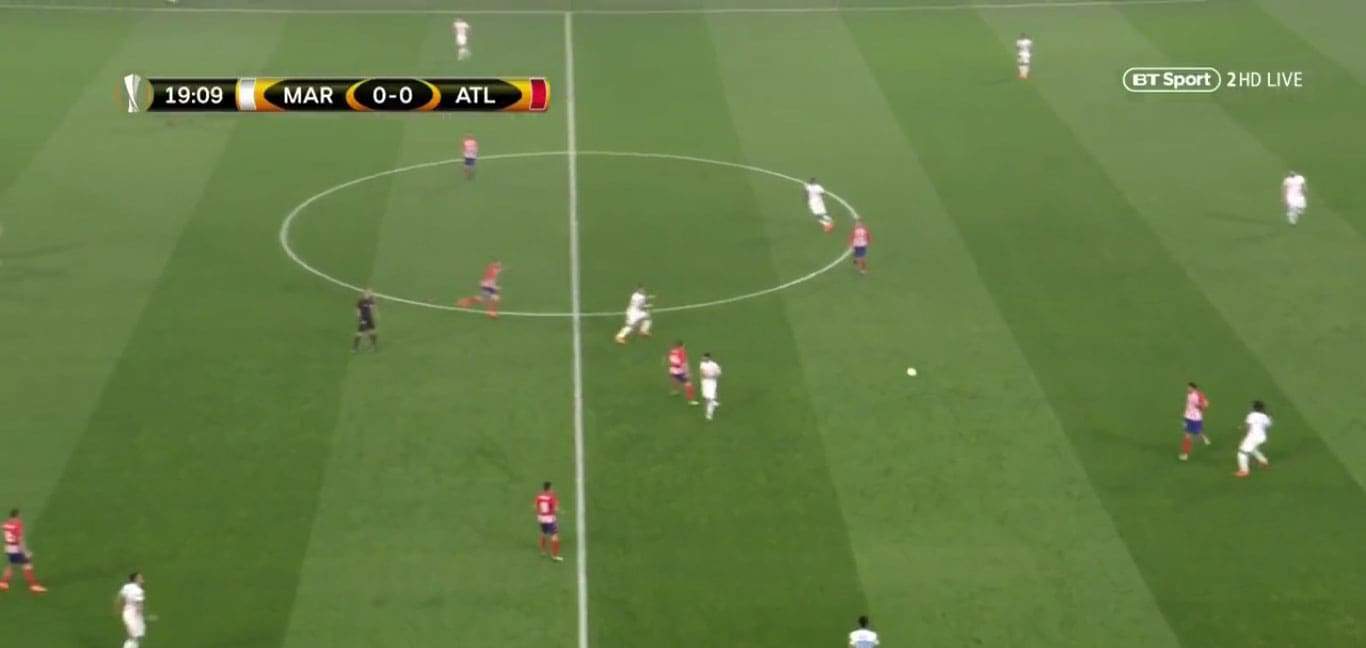
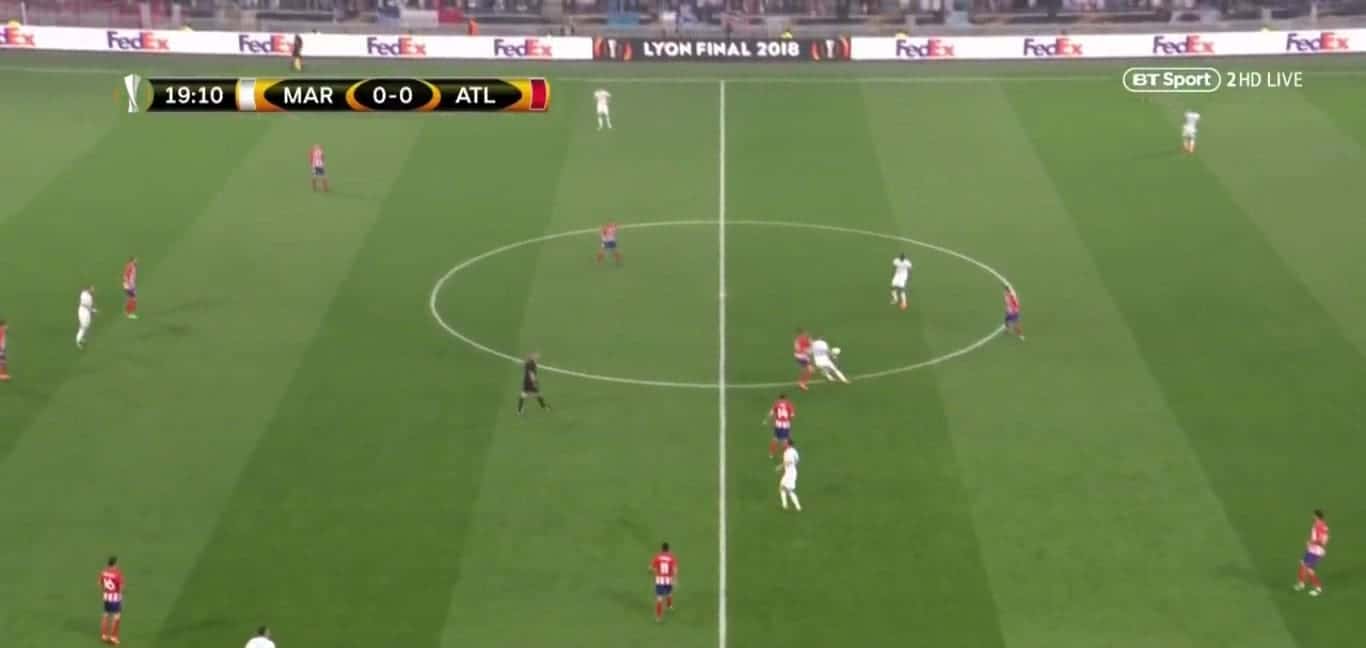
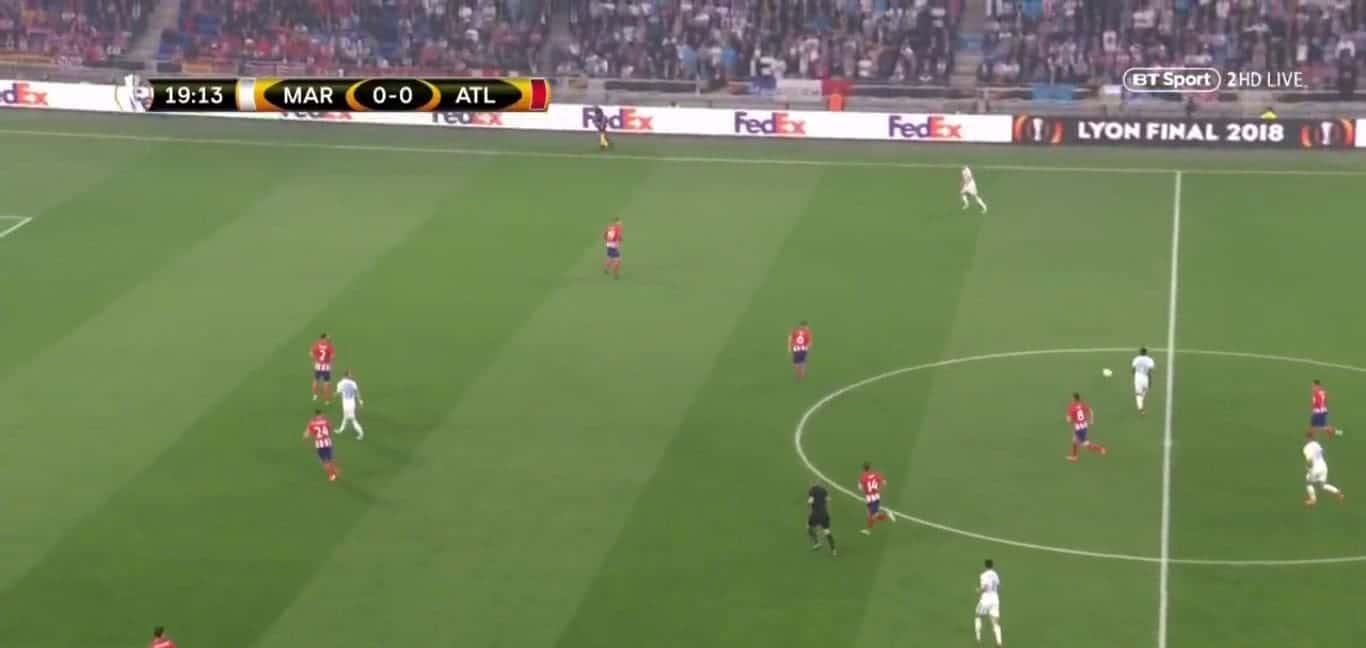
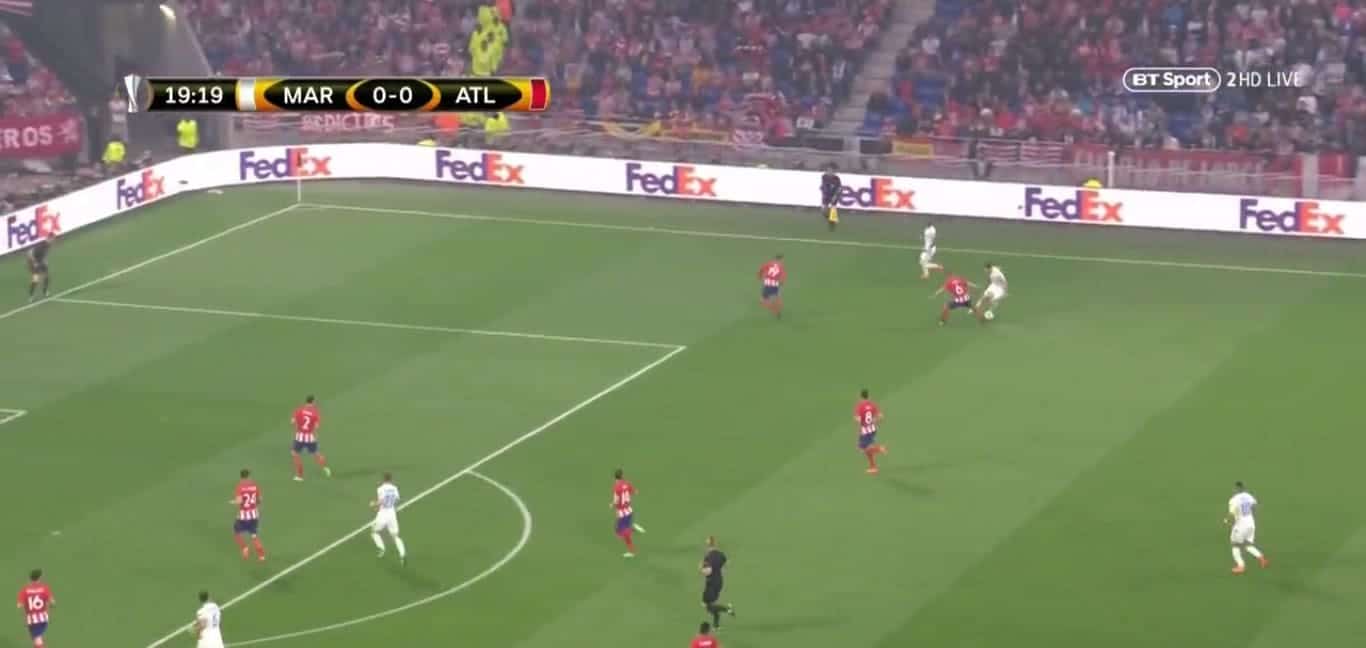
With this strategy Marseille kept Atletico pinned back into their own half, unable to construct proper attacks with only Griezmann and Costa forward, however, they also didn’t threaten much. Their best opportunity came a few minutes into the match, catching Atletico’s midfield high up the pitch for a throw-in and setting up Germain with some quick passes through the centre from the three attacking midfielders, but for the majority of the match, they were relying on crosses.
The winger on the opposite flank to whichever side the ball was being played down would tuck into the middle to offer another body in the box alongside Germain, but Atletico’s defenders are big and strong in the air so they were able to defend the crosses easily. That was if Marseille even managed to send them in – even with the full-backs bombing forward in support, Atletico were able to quickly move players across whenever the ball went wide and outnumber Marseille in wide areas to stop the crosses.
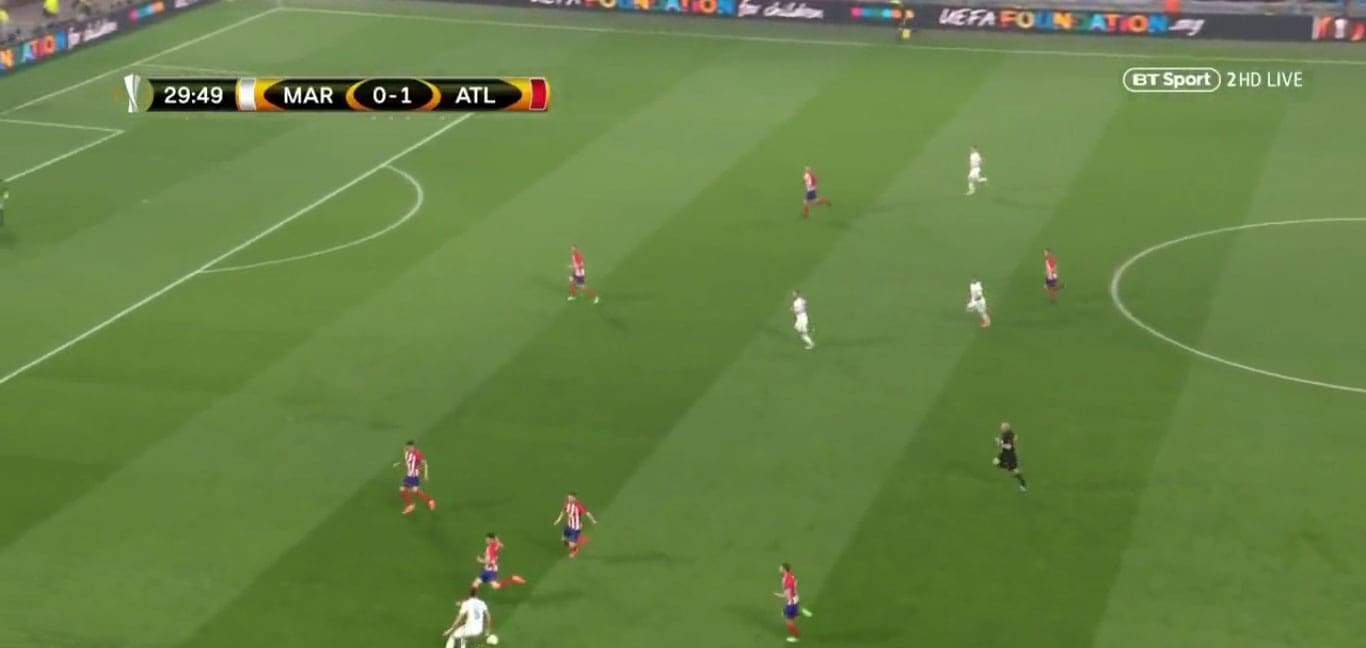
Even this early on, the game reached a strategic impasse. Atletico were happy for Marseille to go wide even if it forced them into defending, while Marseille were happy to go wide even if it wasn’t an effective way of attacking. Neither team looked likely to score.
And yet Atletico did. Griezmann and Costa pressed Marseille’s centre-backs, causing them to go back to the goalkeeper. The centre-backs split, opening up an easy pass into the feet of Anguissa, which Mandanda utilised, only for Anguissa to miscontrol the ball. Gabi was on hand to knock the ball into the path of Griezmann and, as the centre-backs had pulled wide to aid them playing out from the back, he was put one-on-one with Mandanda to finish.
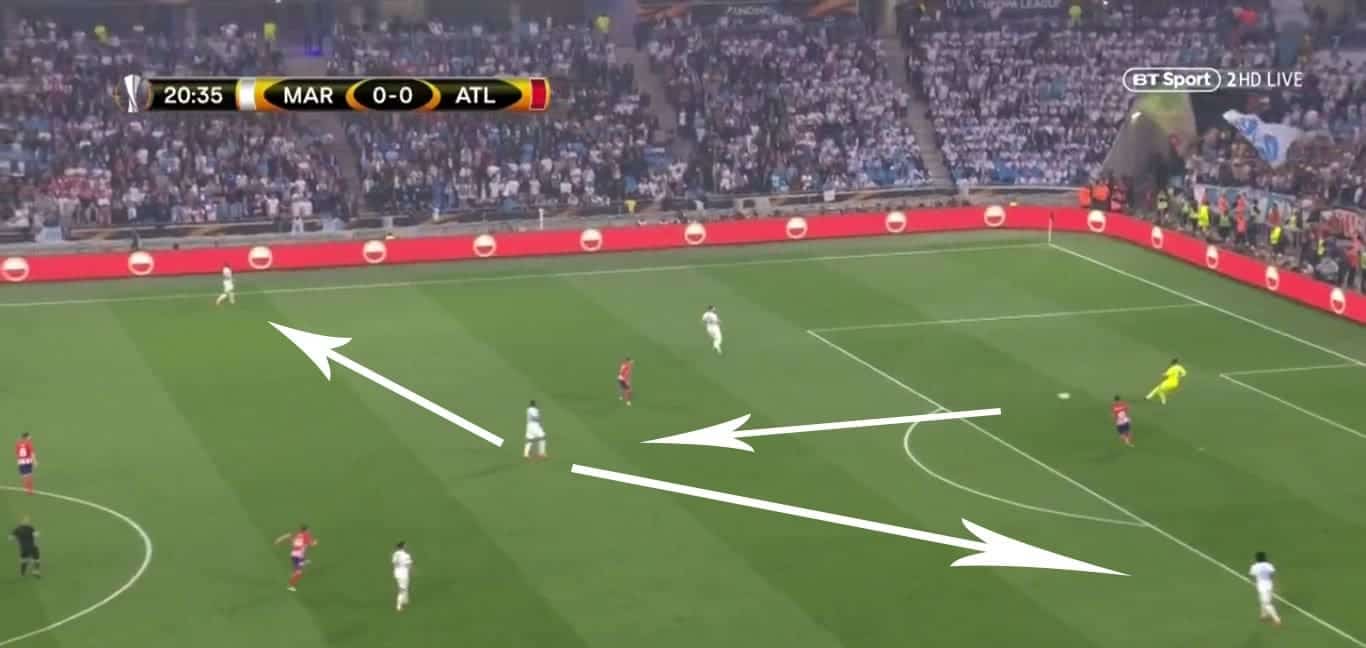
Anguissa had easy passes back to Luiz Gustavo or wide to Sarr that would have seen Marseille play out with little trouble, but his mistake highlighted the dangers of this approach, especially the centre-backs splitting in this manner.
Atletico hadn’t created anything but with their pressing and quality are capable of punishing any mistakes. It put them 1-0 up and then the onus was on Marseille to break them down.
To sum up the next 70 minutes of the game: they didn’t. They lost Payet to injury ten minutes later and, while his replacement Maxime Lopez is clearly less talented, the local lad dropped back much closer to Anguissa and Sanson than Payet had, helping Marseille’s build-up, but otherwise their strategy didn’t change: get the ball out to Ocampos or Thauvin and swing in a cross.
Clinton N’Jie was introduced for Ocampos shortly into the second half, which probably weakened them as Ocampos had been causing Vrsaljko problems, but the introduction of Konstantinos Mitroglou for Germain was a major improvement – the starter didn’t offer much in his movement and isn’t particularly tall, so the bigger Greek posed a greater threat to Atletico’s defenders.
It was little more than rearranging deck chairs on the Titanic though: their crossing tactic wasn’t working but Garcia never made any effort to change the plan and Atletico could see out the game with ease.
The Spanish club added to their scoreline by taking advantage of another issue in Marseille’s game. As the wingers had to stay quite high and wide, Marseille’s holding midfielders were often required to come across to cover close to the touchline, which left space between the lines for Atletico to exploit.
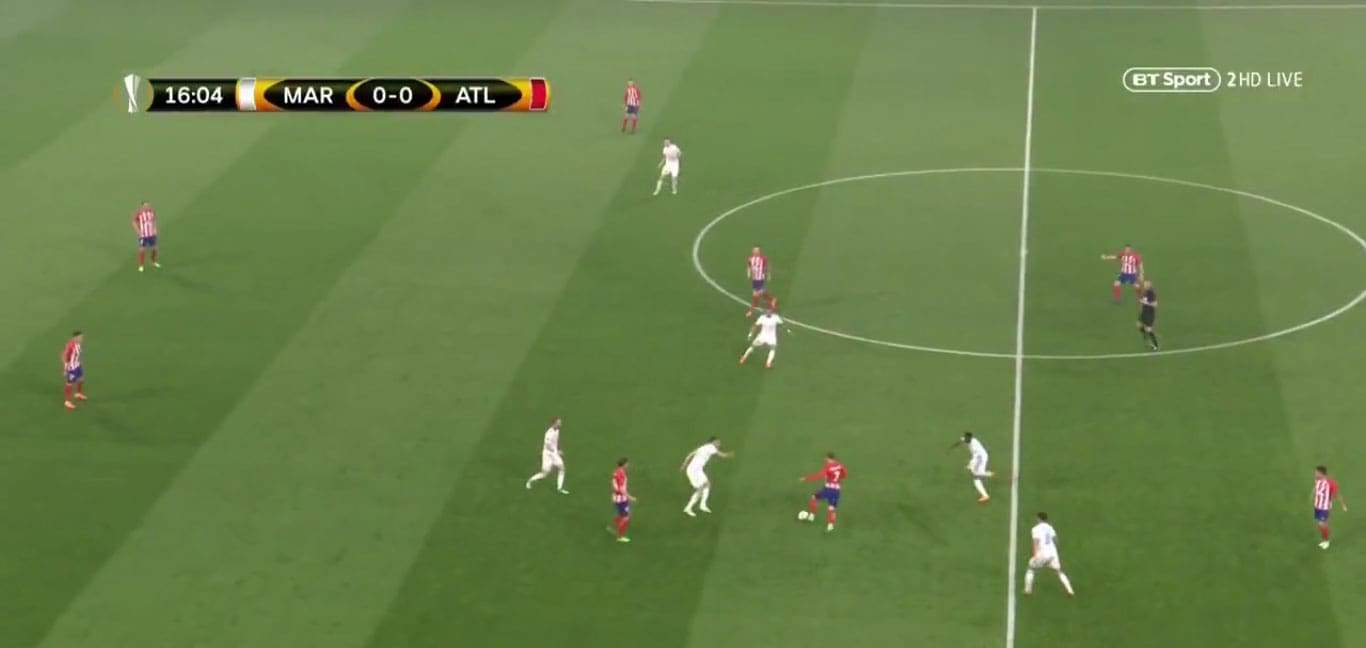
Minutes into the second half, Atletico won the ball back from a Marseille throw-in and, with Marseille’s holding players close to the touchline, Koke ran into the space through the centre to set up Griezmann for his second.
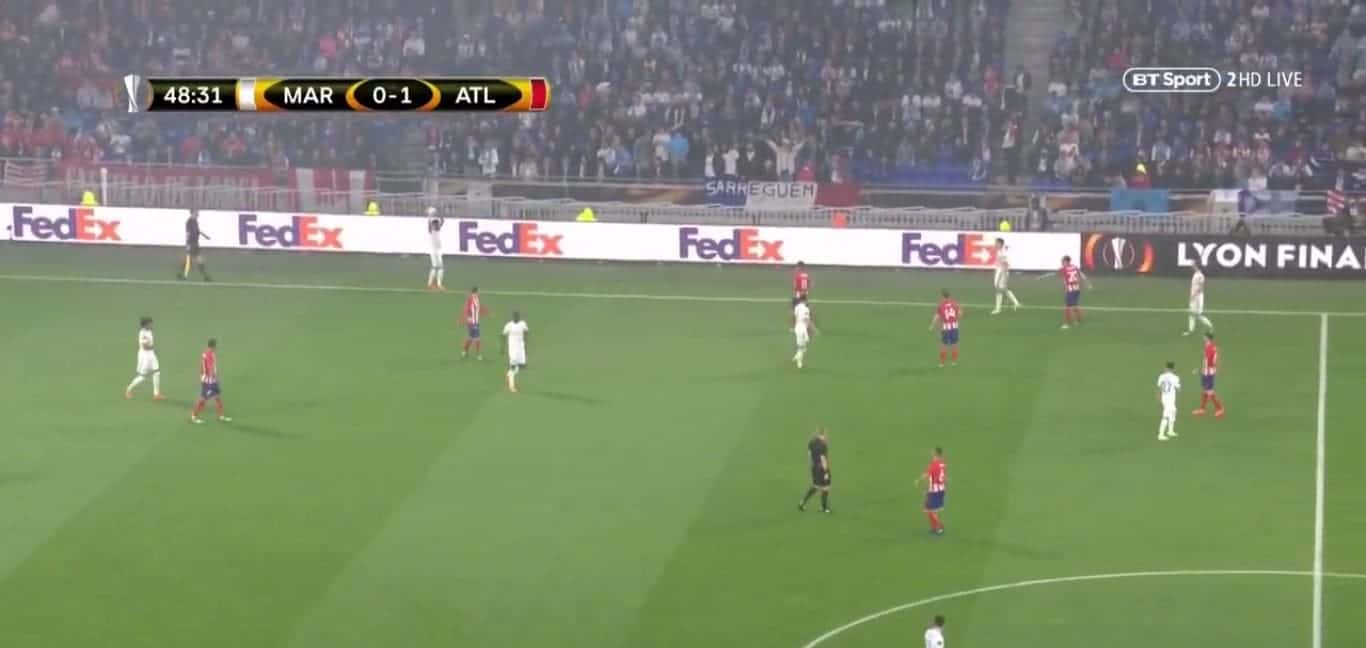
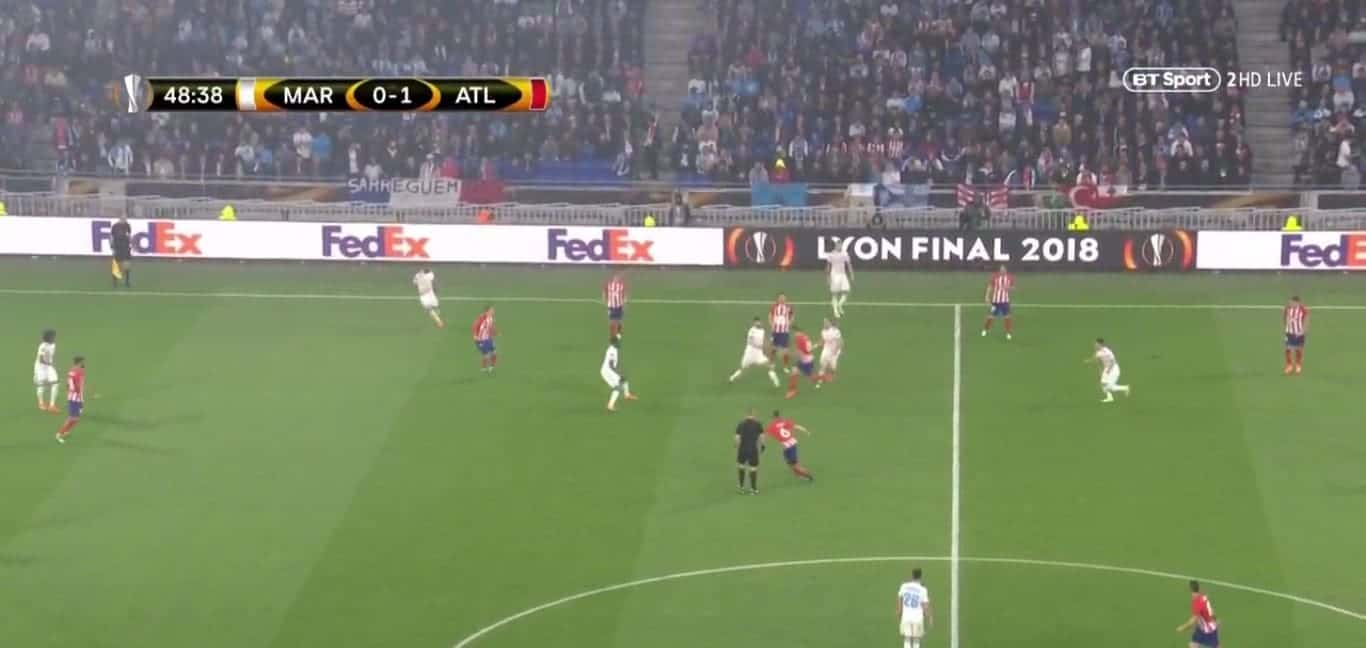
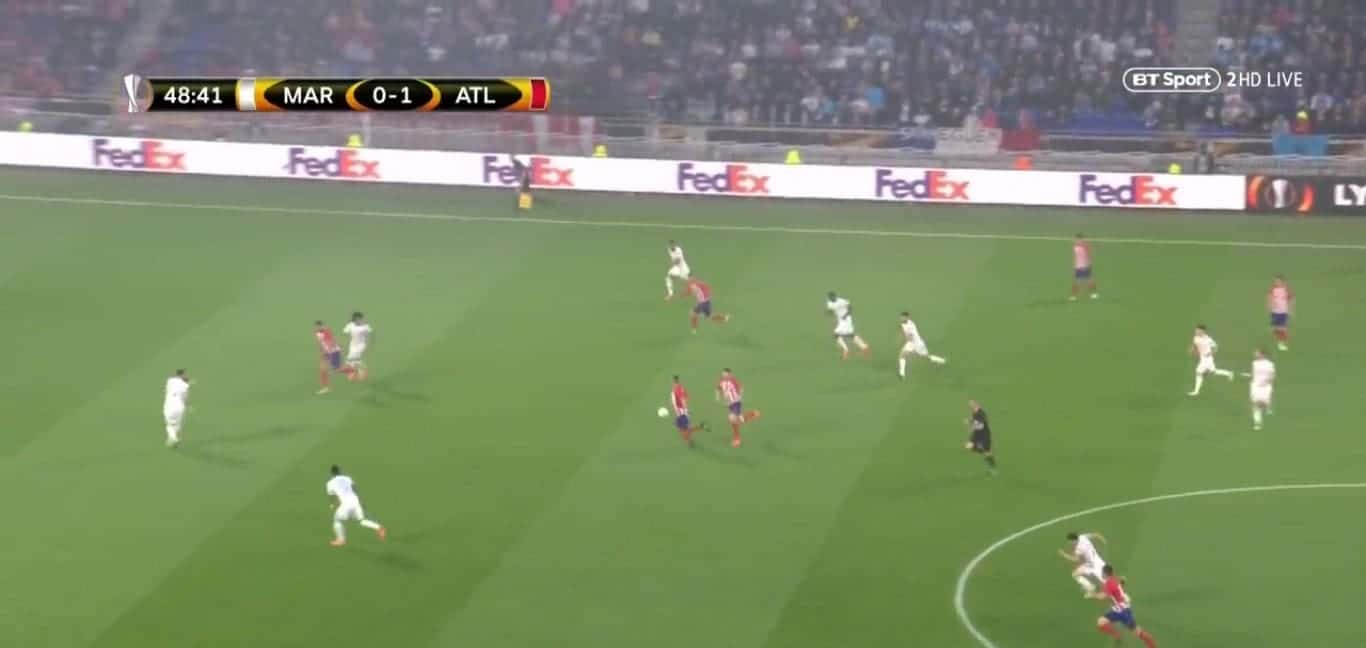
The same thing happened minutes from full-time. Substitute Thomas Partey claims the ball following a Marseille throw-in and sends it to Griezmann between the lines, who has the space to turn and send Costa running, eventually setting up Gabi at the back post to confirm the win. Admittedly, this time it was aided by Sanson pushing forward in attack with Marseille in desperate need of a goal.
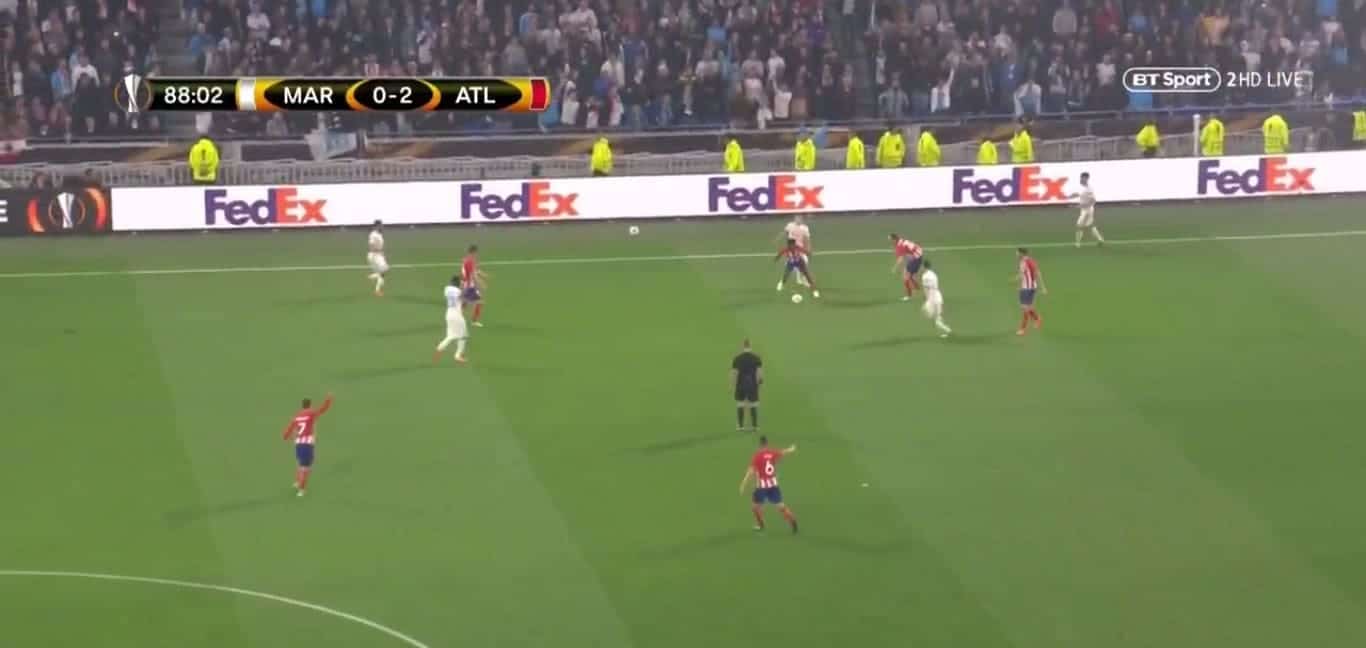
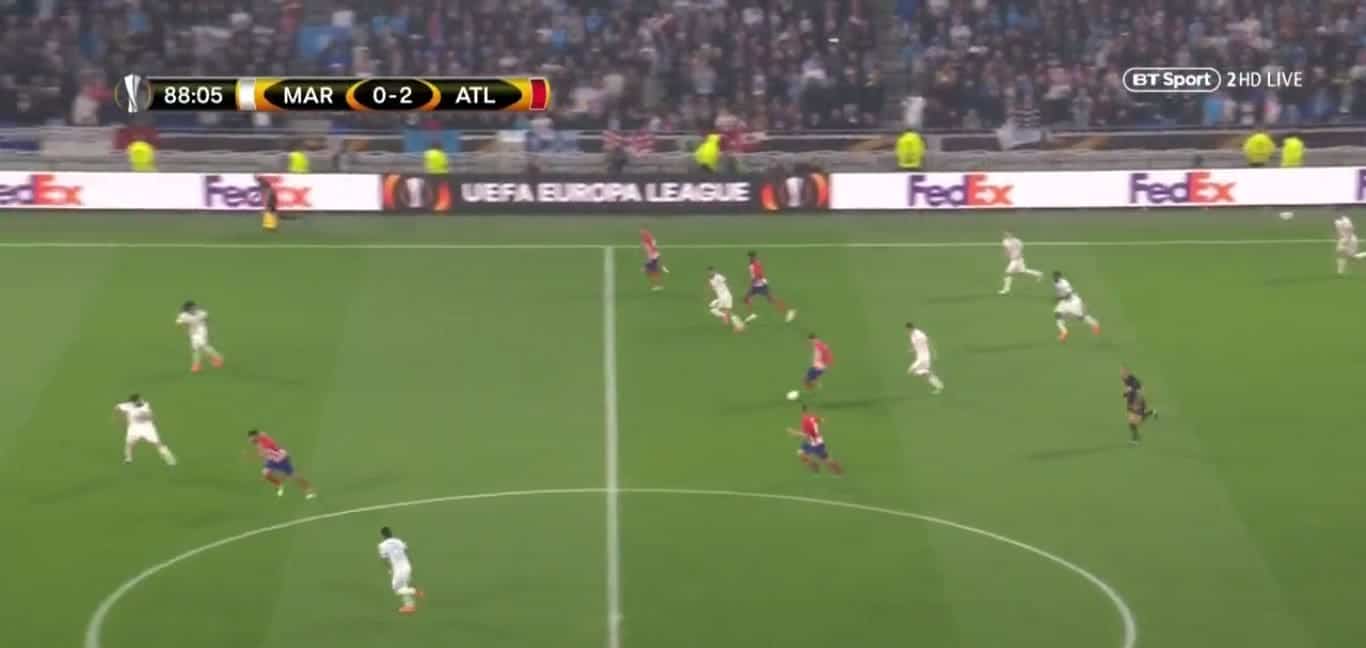
Atletico got their first trophy in four years but Marseille never really tested them.

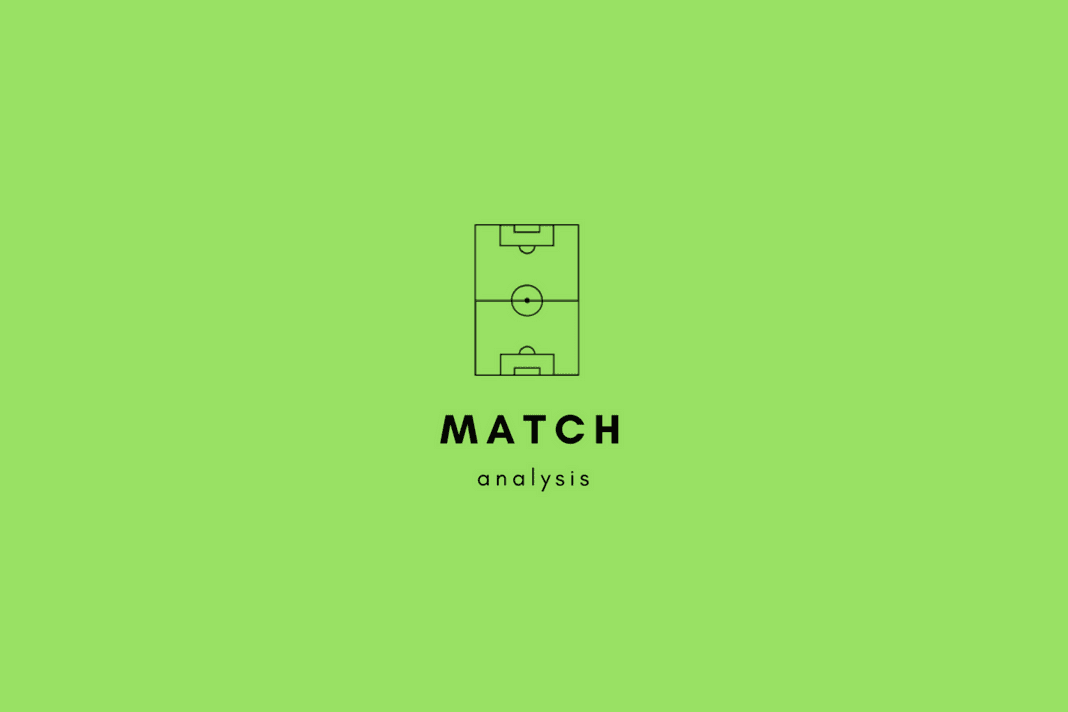




Comments